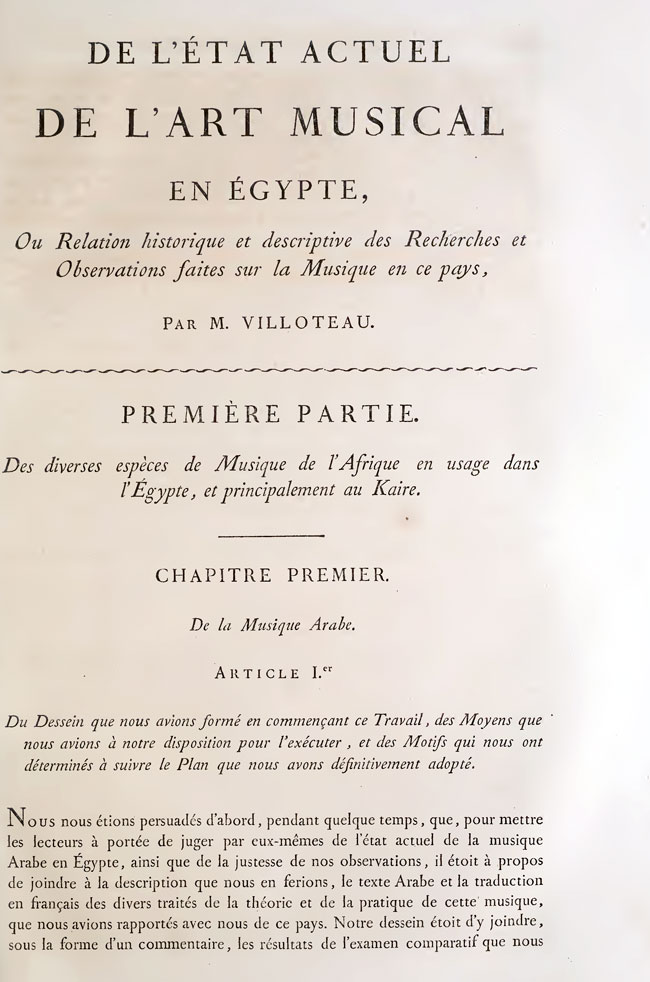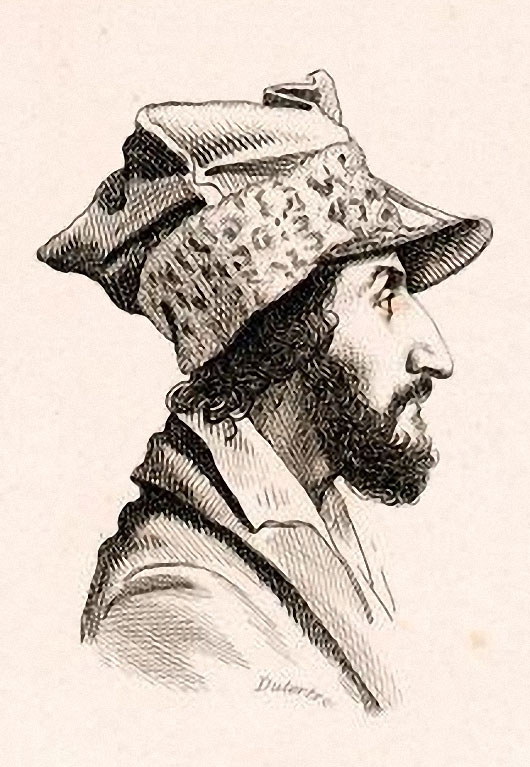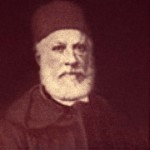Translated from the French by Jan Lancaster
Villoteau (Guillaume-André), son of a teacher, born the 6th of September 1759, at Bellême (department of the Orne). Having lost his father at age three and a half, he was admitted some time afterward, as a choirboy, in the collegiate church of Mans, and made his first literary and musical studies in this cathedral music school… persecuted by the obsessions of his relatives for him to enter the seminary and become a priest, he made the resolution to flee and to travel as a wandering church musician, what was called then a vicarier; but soon tiring of this kind of life, he joined a regiment of dragoons… The desire to acquire learning led him then to the college of Montaigu in order to take for two years a course in philosophy; then, to Paris, where he attended, for another three years, lessons by doctors de La Hogue and Asseline at the Sorbonne. After having received Holy Orders, he was associated with the choir of the cathedral of Paris…The little taste he had always had for the ecclesiastic state made him abandon it in order to enter, in 1792, the chorus of the Opéra, where he was then the leader of the chorus… Villoteau left this position, in the year VI of the Republic [1797], in order to join a group of eminent scholars brought to Egypt by General Bonaparte…
His goal was to gather facts and materials concerning music of the various Oriental peoples who mixed on the soil of Egypt, particularly the Arabs, the Copts, the Greek monks, and the Armenians. Furnished with an abundant harvest of notes, musical treatises and instruments, he returned to Paris in the year VIII [1799], and put himself to work with ardor to the part which he would provide to the great work, the Description de l ‘Égypte. For several years, he occupied himself researching, in the great libraries of Paris, the appropriate documents to fill in the lacunae of his researches in Egypt, and to obtain from the friendship of the Orientalist scholars Silvestre de Sacy, Herbin and Sédillot, translations from the original treatises of Oriental music… these researches appeared successively in the volumes of the Description de l’Égypte. The various parts of the work by Villoteau are:
1) Treatise on the music of the ancient Egyptians…
2) Treatise on the various kinds of musical instruments which are among the sculptures which decorate the antique monuments of Egypt, and on the names that were given to them, in their proper language, the first peoples of this country…
3) On the current state of musical art in Egypt, or historic and descriptive account of researches and observations made on the music in this country…
4) Historical, technical, and literary description of the musical instruments of the Orientals…
… The other parts of the work by Villoteau, having as the object the report of the current state of music of the different peoples who live in Egypt, have the benefit of resting on the obvious facts; and, as the author has united very extensive knowledge with a deep and varied erudition as he has elsewhere enlivened his researches with an indefatigable zeal which does not retreat from difficulty, he has given precious information on the music of the Orientals which corrects the incomplete or false notions which we have received… His work concerning the chant of the Greek Church merits praise particularly… This scholar had prepared another treatise on the nature and the character of various kinds of chant and of poetry in use in ancient Egypt; but he was not able to get it inserted into the Description of this country, because it was considered too conjectural by the commission responsible for the publication of this great work. In order to complete finally the task he had undertaken with regard to the music of the Orientals, he was prepared to edit a dictionary on all that concerned the theory and practice of this music with the translation and explanation of technical terms of Arab, Turkish, Persian, Ethiopian, Armenian and modern Greek music; however, he only left the collection of materials for this work.
Villoteau had read, for the Société libre des sciences et arts de Paris, Treatise on the possibility and usefulness of an exact theory of natural principles of music; this small work, which was only the prelude of a much more considerable work … appeared in Paris …The book, which was only the introduction, was subsequently published under the title: Researches on the analogy of music with the arts which have as their object the imitation of language in order to serve as an introduction to the study of the natural principles of this art…
There were so few readers in France for these books on music, during the period in which they appeared, that they did not sell. …
Villoteau, no more than those who had preceded him in this doctrine, did not perceive that to reduce music to the principle of imitation, means to remove from it the sublime of the ideal in order to reduce it to empiricism; means to lower it in wishing to raise it; means to narrow the domain which is proposed to be enlarged. Declaimed chant is undoubtedly part of this art, and truth of accent is one of the elements of its aesthetic; but this is only a speck in its immensity… One of his favorite ideas is of reforming music in order to make it the guardian of morals: this idea is borrowed from antiquity; but, again, he is mistaken, because music does not rule the morals; its various characteristics are, on the contrary, the product, and its successive transformations are in necessary relation with the transformations of the society…
… Villoteau had been nominated as a member of the Institut de l’Égypte and for the commission for the great work concerning this country, decreed by the government. In his relations with his colleagues, he soon found himself ill at ease. Most of these scholars were men of the world, used to business and skillful in profiting from their position. The propensity for solitude and the complete unawareness of the world made Villoteau rather unfit to get on well together with them… he became suspicious, unjust toward several of his colleagues who were happier and more skillful; he blamed them for his unhappiness, and this idea followed him to the grave…
Villoteau stripped, dispossessed was forced to retreat to a house which remained to him in Tours, and he lived there with a modest pension, sustained by the public esteem for him…
Then began again his works on music. The same ideas which had directed him in the conception of his Researches on the analogy of music with the arts which have as their object the imitation of language, guided him in the editing of a new book to which he gave the title Treatise on phonethesia…
… In his last years, he translated into French the seven Greek authors of music published by Meibom, and added to them some commentaries: he had the time to complete this great work. The manuscripts of the Greek texts, the Latin version, and the French translation with notes were acquired by the library of the Paris Conservatory.
Excerpts from Fétis, François-Joseph, 1784-1871. Biographie universelle des musiciens et bibliographie générale de la musique. Paris: vol. 8, pages 349-353




